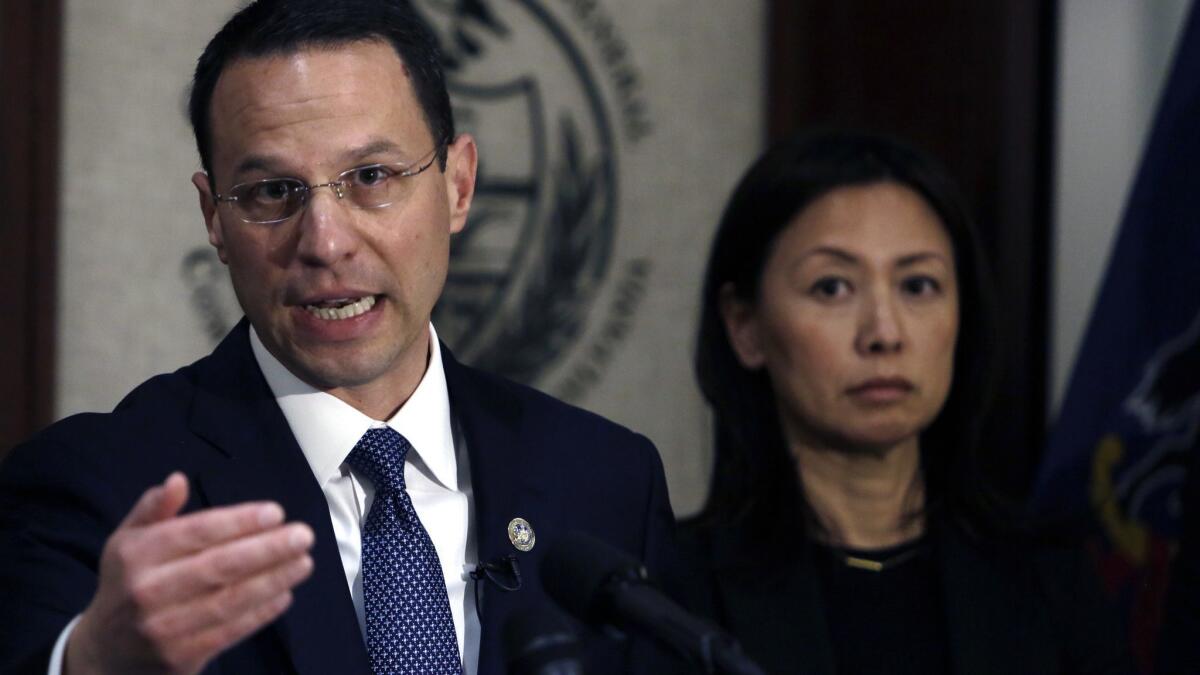Opinion: GOP support for a frivolous lawsuit shows how Trump has corrupted the party

- Share via
Unless a who’s who of legal experts are wrong, the Supreme Court will reject an attempt by the state of Texas — supported by Sore-Loser-in-Chief Donald Trump — to overturn the election results in four states won by President-elect Joe Biden.
But even if the court does its duty and tosses this meritless lawsuit, enormous damage has been done to American democracy.
Given his narcissism and predilection for lying, it was unseemly but not surprising when Trump, peddling fantastical theories about massive voter fraud, refused to accept defeat, despite a cascade of contrary court decisions. But he isn’t alone in ensuring that the presidency Biden will claim on Jan. 20 is a poisoned chalice.
Top congressional Republicans, including Senate Majority Leader Mitch McConnell of Kentucky and House Minority Leader Kevin McCarthy of Bakersfield, have acquiesced in Trump’s disinformation campaign, hiding behind pious statements about counting every legal vote.
Even more offensive, 126 Republican members of the House have moved to file a friend-of-the court brief supporting Texas’ attempt to have the Supreme Court thwart the will of voters in Pennsylvania, Michigan, Wisconsin and Georgia. They include four Californians: McCarthy and Reps. Ken Calvert of Corona, Doug LaMalfa of Richvale and Tom McClintock of Elk Grove. (The names of McCarthy and 19 other House Republicans were added Friday to an original list of 106 names.)
These members of the “people’s House” argue that the authority of state legislatures to control the selection of presidential electors was “usurped at various times by governors, secretaries of state, election officials, state courts, federal courts and private parties.”
That argument doesn’t pass the judicial laugh test, and Texas’ case recycles arguments that were rejected by other courts.
Essentially Texas is asking the Supreme Court to invalidate the outcome of the presidential election in those states and allow state legislatures to name electors. If that couldn’t be done by the time the electoral college voted, Texas notes that in the absence of an electoral vote majority, the House of Representatives could choose the president.
Lawyers for the four states disagreed. As Pennsylvania Atty. Gen. Josh Shapiro noted in his devastating response, “Texas has not suffered harm simply because it dislikes the result of the election, and nothing in the text, history or structure of the Constitution supports Texas’s view that it can dictate the manner in which four other states run their elections.”
Shapiro argued that the Supreme Court “should not abide this seditious abuse of the judicial process, and should send a clear and unmistakable signal that such abuse must never be replicated.” (On Friday, Texas responded to the other states’ arguments, but not in a persuasive way.)
But even if the court does its duty, it’s outrageous that 126 members of Congress — as well as 18 Republican state attorneys general — rushed to support Texas in this probably futile attempt to hijack the elections in four states.
If the lawsuit fails, some Republicans have a backup plan: blocking Congress from certifying Biden’s victory in the electoral college. Sixty-four Republican members of the Pennsylvania legislature have urged members of Congress from that state to object to the certification of electoral votes from Pennsylvania. Rep. Mo Brooks (R-Ala.) also has said that he plans to challenge the certification of Biden’s victory on Jan. 6.
The rush of Republicans to support Trump’s denialism demonstrates how, even in defeat, the soon-to-be-ex-president calls the tune for many in his party.
That Republicans feel that they dare not alienate Trump voters is an explanation for their behavior, but it’s not a justification. The rot in the Republican Party threatens not only Biden’s ability to govern, but also the future of the democratic process. A rebuke by the Supreme Court, however necessary, can’t cure that contagion.
More to Read
Updates
11:50 a.m. Dec. 11, 2020: Updated to reflect the addition of 20 names to the brief signed by House Republicans.
A cure for the common opinion
Get thought-provoking perspectives with our weekly newsletter.
You may occasionally receive promotional content from the Los Angeles Times.











